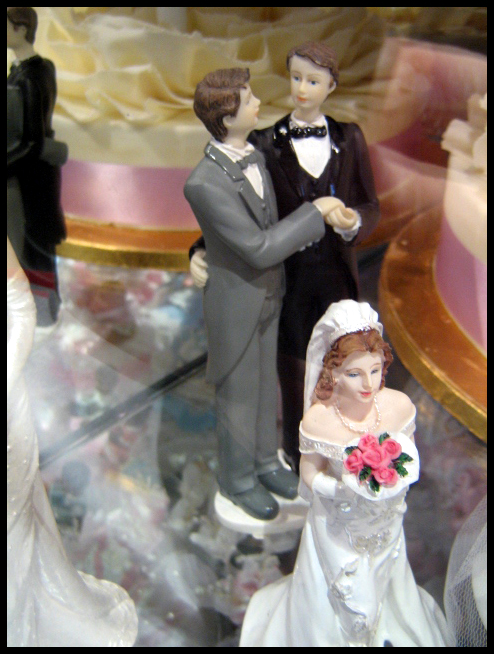
Those of you who have paid attention to the Conservative Judaism movement in recent months may recall that it is officially, like, so totally inclusive now. As JTA reported when the news broke:
“The Conservative movement – affirming that same-sex marriages have ‘the same sense of holiness and joy as that expressed in heterosexual marriages’ — last week established rituals for same-sex wedding ceremonies.”
Welcome to the 21st century, Conservative Judaism! There’s cake by the punch bowl.
All kidding aside, this is a pretty big deal. Reconstructionist Judaism has been affirming of LGBT Jews since at least the early 90s, while Reform Judaism fully opened itself to greater equality in 2000. It’s nice to see Conservative Judaism, uh, finally taking these steps.
But wait, what’s that? All’s not well after all?
The New York Post is reporting that some Conservative Jews feel the LGBT ceremonies developed by the movement are… wait for it… more equal than the ones offered for heterosexual couples. Obviously, that’s a problem.
Here’s the breakdown for hetero-couples, for those who don’t know:
- Groom gives bride a ring, acquires her “according to the law of Moses.” Bada-BING. Halakhic marriage achieved.
- Because it’s the 21st century, bride is also allowed to say a few words: either the same words as her groom, if the rabbi’s cool about it, or something else. Total halakhic significance to the bride’s contributions? Spoiler alert: none.
Here’s where things get good. Mayrav Saar reports, “In place of the ‘I’m buying you for this many shekels’ formula, the same-sex ceremonies have both parties declaring a kinyan, or acquisition, not of each other but of the partnership itself. The new formula is still not a kiddushin, because a kiddushin requires the ‘dominant’ party to acquire the ‘less dominant’ party — and in same-sex marriages, ‘neither is a dominant party,’ the rabbis wrote.”
Buuut wait, there’s more! In addition to a basic affirmation of the inherent equality of both partners, LGBT Conservatives also get better rights regarding Jewish divorce. Saar writes, “The same-sex model allows either party to dissolve the marriage because, as the rabbis noted, if only a man can initiate a divorce, in a marriage of two women, presumably nobody could.”
Unsurprisingly, this newfangled halakhic equality has some from the hetero camps curious: could this same liturgical progression be applied to straight Conservative couples who, you know, want it?
Not so fast.
This bit from the article sums it up completely.
“While some heterosexual couples may see in these new models of brit (covenant) and shutafut (partnership) for same-sex couples a basis for abandoning the traditional model of kiddushin, Conservative Judaism has taught us to respect ancient liturgy and to minimize modifications of text,” wrote Rabbi Avram Israel Reisner, of Baltimore, who wrote the liturgy along with Rabbi Elliot Dorff of Los Angeles and Rabbi Daniel Nevins, dean of the Rabbinical School at the Jewish Theological Seminary in New York.
I can hear you face-palming from here.
This whole thing is absurd. And speaks to the larger problems of identity crisis that Conservative Judaism faces today.
In the mid 20th century, Conservative Judaism was king of the pack among Western Jews. It allowed Jews to dip their toe in the water of “progressivism” without the broad-strokes alterations of the Reform and, later, Reconstructionist branches. The strong connections that it had to tradition (while also allowing the pleasures of secular assimilation) were a huge part of its appeal.
But, over time, the ends of the spectrum moved farther away from each other. The result? Conservative Judaism is no longer squarely in the gap between Orthodox and Liberal Jews, and has little to offer that can’t be found elsewhere. Traditionally observant Jews can go the Modern Orthodox route, progressive-but-traditional Jews can do Reconstructionist, and everybody else can find something in Reform, Renewal or an independent minyan.
As much as I have my qualms with Orthodox theology, it is what it is; there’s nothing surprising about it. Reform Judaism is the same in that sense, too. Both movements offer exactly what they advertise. But Conservative Judaism’s emphasis on tradition seems to be playing second fiddle to the social and ideological needs of the people who could potentially keep it afloat. It isn’t Conservative anymore, at least not in the significant ways it used to be. And its areas of traditional application end up manifesting as hindrances, rather than authentic pathways into Jewish meaning.
Considering these slow climbs toward gender and LGBT equality, I can’t help but wonder…is there room for Conservative Judaism as a major denominational player? Is Conservative Judaism just the stepping stone into Orthodox, Reform, or Reconstructionism?
Should progressive, non-dogmatic forms of religion even have a place in defining the nature of the relationships between its married or committed partners? Does the specific wording of the wedding liturgy even matter?
The answer isn’t entirely clear. But with Conservative Judaism sorting out the details, while many Western Jews are completely comfortable making their own path socially and ideologically, it seems the answer needs to present itself. And fast.
